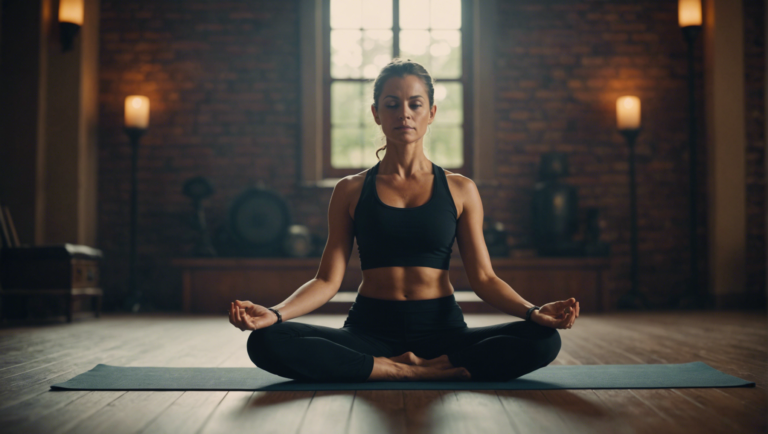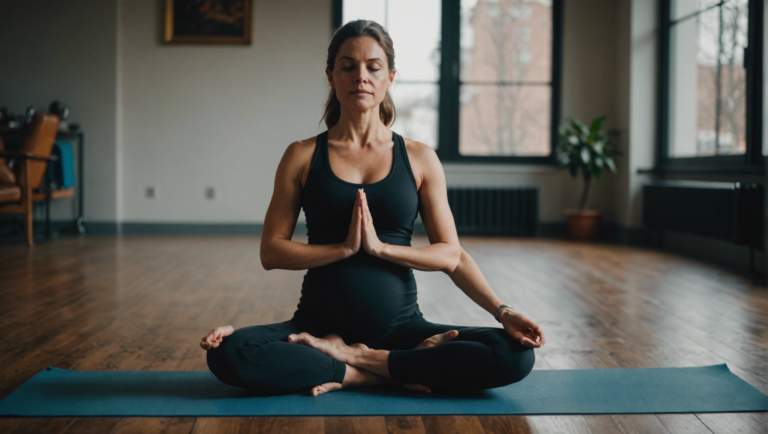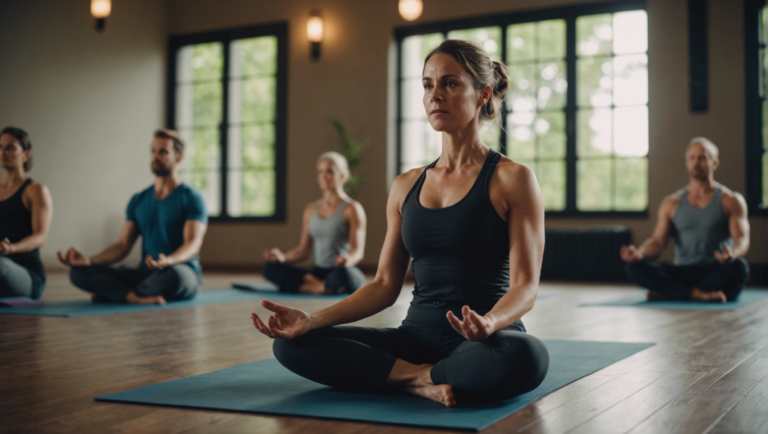Guidelines For Planning And Participating In A Yoga Retreat
Exploring the Benefits of Attending a Yoga Retreat
Yoga retreats offer a unique opportunity to dive deep into the practice of yoga, mindfulness, and self-care in a serene and rejuvenating environment. These retreats provide a break from the hustle and bustle of daily life, allowing participants to reconnect with themselves on a physical, mental, and spiritual level. Let’s explore the numerous benefits of attending a yoga retreat.
Rejuvenate Your Mind, Body, and Soul
Attending a yoga retreat allows you to break free from your routine and immerse yourself in a peaceful and supportive environment. By dedicating several days to the practice of yoga, meditation, and relaxation, you can rejuvenate your mind, body, and soul. The combination of yoga classes, healthy meals, and peaceful surroundings can help you release stress and tension, promoting overall well-being.
Deepen Your Yoga Practice
One of the primary benefits of attending a yoga retreat is the opportunity to deepen your yoga practice. Whether you are a beginner or an experienced yogi, the focused and immersive nature of a retreat allows you to explore different aspects of yoga, try new styles or techniques, and refine your practice under the guidance of experienced instructors. This deeper immersion can lead to breakthroughs in your practice and a deeper connection to yourself.
Connect with Like-Minded Individuals
Yoga retreats attract individuals from all walks of life who share a common interest in yoga, wellness, and self-discovery. By participating in group activities, workshops, and meals, you have the opportunity to connect with like-minded individuals, share experiences, and build meaningful relationships. The sense of community and support that emerges during a retreat can be a source of inspiration and motivation that extends far beyond the duration of the retreat itself.
Reconnect with Nature
Many yoga retreats are held in beautiful natural settings such as mountains, forests, or by the seaside. Spending time in nature can have a profound impact on your well-being, helping you feel more grounded, connected, and at peace. The fresh air, natural surroundings, and opportunities for outdoor activities can enhance your overall retreat experience and provide a welcome escape from urban life.
Nurture Self-Care and Mindfulness
Attending a yoga retreat is an act of self-care and mindfulness in itself. By dedicating time to focus on your well-being, you can cultivate a sense of mindfulness and presence that carries over into your daily life. The retreat environment encourages you to slow down, listen to your body, and prioritize self-care, helping you develop healthy habits and a balanced lifestyle even after the retreat ends.
Attending a yoga retreat offers a myriad of benefits for the mind, body, and soul. Whether you are looking to deepen your yoga practice, recharge in nature, connect with like-minded individuals, or simply take a break from your routine, a yoga retreat can be a transformative and rejuvenating experience. Consider joining a retreat to explore these benefits firsthand and embark on a journey of self-discovery and renewal.
Understanding the Different Types of Yoga Retreats
Yoga retreats offer a transformative experience by combining the benefits of yoga practice with a serene getaway. Understanding the different types of yoga retreats can help you choose the one that best suits your goals and preferences. By exploring various options, you can tailor your retreat experience to align with your needs, whether you seek relaxation, adventure, spiritual growth, or a combination of these elements.
Reasons to Attend a Yoga Retreat
Embarking on a yoga retreat provides a unique opportunity to deepen your practice in a supportive environment. Whether you are a beginner or an experienced yogi, a retreat allows you to immerse yourself fully in yoga and mindfulness practices without the distractions of daily life. Additionally, you can connect with like-minded individuals and experienced instructors who can guide you on your journey.
Types of Yoga Retreats
-
Wellness Retreats: Focus on holistic well-being, including yoga, meditation, healthy eating, and relaxation techniques. These retreats often incorporate spa treatments, nutritious meals, and activities aimed at rejuvenating the body and mind.
-
Adventure Retreats: Combine yoga practice with outdoor activities such as hiking, surfing, or rock climbing. These retreats offer a blend of physical challenges, mindfulness practices, and connection with nature for an exhilarating experience.
-
Spiritual Retreats: Center around deepening spiritual awareness and inner reflection. These retreats may include silence periods, meditation sessions, and workshops on spiritual teachings to facilitate personal growth and self-discovery.
-
Detox Retreats: Focus on cleansing the body through specific diets, yoga practices, and wellness treatments. These retreats aim to eliminate toxins, promote healthy habits, and revitalize the body for overall well-being.
-
Luxury Retreats: Offer a high-end experience with luxurious accommodations, gourmet meals, spa treatments, and personalized yoga sessions. These retreats cater to those seeking a pampering experience in a lavish setting.
Choosing the Right Retreat for You
When selecting a yoga retreat, consider the following factors to ensure it aligns with your preferences and goals:
-
Location: Choose a retreat in a setting that resonates with you, whether it’s a beach resort, mountain retreat, or tranquil countryside.
-
Duration: Decide on the length of the retreat that suits your schedule and allows you to fully immerse yourself in the experience.
-
Instructors: Research the background and teaching style of the instructors leading the retreat to ensure they align with your preferences and level of practice.
-
Activities: Consider the activities offered during the retreat, such as yoga classes, meditation sessions, excursions, and workshops, to ensure they meet your expectations.
By understanding the different types of yoga retreats and considering your preferences and goals, you can choose a retreat that resonates with you and offers a transformative experience. Whether you seek relaxation, adventure, spiritual growth, or a combination of these elements, a yoga retreat can provide a rejuvenating escape to nurture your body, mind, and spirit.
Essential Factors to Consider When Planning a Yoga Retreat
When embarking on the journey of planning a yoga retreat, there are several essential factors to consider in order to ensure a successful and fulfilling experience for all participants. From choosing the right location to crafting a well-rounded itinerary, each decision plays a crucial role in shaping the overall retreat experience. Let’s delve into the key considerations that should be taken into account when planning a yoga retreat.
Selecting the Perfect Location
The location of your yoga retreat sets the tone for the entire event. It’s important to choose a serene and peaceful setting that allows participants to fully immerse themselves in their practice. Whether it’s a beachfront paradise, a tranquil mountain retreat, or a lush forest getaway, the environment should inspire relaxation and connection with nature. Consider factors such as accessibility, accommodation options, and local attractions when selecting the perfect location for your retreat.
Crafting a Thoughtful Itinerary
A well-structured itinerary is essential for a successful yoga retreat. Balance is key when planning daily activities, including yoga sessions, meditation practices, workshops, and free time for exploration and relaxation. Make sure to include a variety of offerings to cater to participants of all levels and interests. Additionally, consider incorporating opportunities for community building, such as group meals, discussions, or excursions, to foster connections among retreat attendees.
Choosing Experienced Instructors
The instructors you choose can make a significant impact on the overall experience of your yoga retreat. Look for experienced and reputable yoga teachers who resonate with the theme and goals of your retreat. Consider their teaching style, areas of expertise, and ability to create a supportive and inclusive environment for participants. A diverse team of instructors can offer a range of perspectives and practices, enriching the retreat experience for all attendees.
Providing Nutritious Meals
Nutrition plays a vital role in supporting the practice of yoga and promoting overall well-being during a retreat. When planning your retreat, ensure that nutritious and delicious meals are included to nourish participants’ bodies and minds. Collaborate with experienced chefs or catering services to create a menu that aligns with the principles of yoga, emphasizing fresh, wholesome ingredients that fuel and energize participants throughout the retreat.
Promoting Mindful Communication
Effective communication is essential for ensuring that participants are well-informed and supported before, during, and after the retreat. Establish clear channels of communication, such as a dedicated website, social media pages, or email newsletters, to provide timely updates and important information to attendees. Encourage open dialogue and feedback to address any questions or concerns that may arise, fostering a culture of mindful communication and transparency throughout the retreat planning process.
Planning a yoga retreat involves a thoughtful and holistic approach that prioritizes the well-being and experience of participants. By considering key factors such as selecting the perfect location, crafting a thoughtful itinerary, choosing experienced instructors, providing nutritious meals, and promoting mindful communication, you can create a transformative and enriching retreat experience for all involved.
How to Make the Most of Your Yoga Retreat Experience
Yoga retreats offer a unique opportunity to unwind, recharge, and deepen your practice in a serene and supportive environment. Whether you’re a seasoned yogi or new to the practice, there are several guidelines to consider to make the most of your yoga retreat experience.
Setting Intentions for Your Retreat
Before embarking on your yoga retreat, take some time to reflect on what you hope to gain from the experience. Setting intentions can help guide your retreat experience and enhance your overall journey. Whether you seek relaxation, spiritual growth, physical challenges, or simply time for self-care, clarifying your intentions can help you make the most of your retreat.
Researching and Choosing the Right Retreat
With a plethora of yoga retreats available worldwide, it’s essential to research and select one that aligns with your goals and preferences. Consider factors such as location, duration, style of yoga, level of expertise, accommodation, and overall atmosphere. Reading reviews, reaching out to the retreat organizers, and understanding the daily schedule can help you choose a retreat that suits your needs.
Preparing Mind and Body
To fully immerse yourself in the yoga retreat experience, it’s beneficial to prepare both your mind and body. Engage in regular yoga practice leading up to the retreat to build strength, flexibility, and endurance. Additionally, cultivate a positive mindset, open heart, and willingness to explore new practices and philosophies during your retreat.
Embracing the Retreat Experience
Once you arrive at the retreat center, let go of any expectations and embrace the present moment. Allow yourself to disconnect from digital distractions, connect with nature, and tune into your inner self. Participate wholeheartedly in yoga classes, workshops, meditation sessions, and other activities offered during the retreat. Be open to learning from experienced teachers, fellow retreat participants, and the overall retreat environment.
Nourishing Your Body and Mind
During a yoga retreat, you have the opportunity to nourish your body with healthy and balanced meals. Embrace mindful eating practices, savoring each bite and appreciating the nourishment it provides. Stay hydrated, prioritize self-care, and get an adequate amount of rest to support your overall well-being during the retreat.
Reflecting and Integrating
As your yoga retreat comes to an end, take time to reflect on your experiences, insights, and personal growth. Consider how you can integrate these learnings into your daily life beyond the retreat. Maintain a regular yoga practice, continue nurturing your mind-body connection, and carry the sense of peace and mindfulness you cultivated during the retreat into your daily routines.
By following these guidelines and immersing yourself fully in the yoga retreat experience, you can make the most of this transformative journey and return home feeling rejuvenated, inspired, and more connected to yourself and the world around you.
Incorporating Mindfulness Practices During a Yoga Retreat
Mindfulness is a powerful practice that involves being fully present and engaged in the moment. When incorporated into a yoga retreat, it can significantly enhance the overall experience for participants. Here are some valuable insights on how to integrate mindfulness practices during a yoga retreat.
The Benefits of Mindfulness in a Yoga Retreat
Mindfulness during a yoga retreat can deepen the mind-body connection, allowing participants to experience each pose more fully and connect with their inner selves on a deeper level. By being present in the moment, individuals can let go of distractions and worries, leading to a sense of peace and relaxation.
Enhancing Yoga Sessions with Mindful Practices
During yoga sessions at a retreat, encourage participants to focus on their breath and sensations in their bodies. Remind them to let go of intrusive thoughts and bring their attention back to the present moment. Practicing mindfulness in each pose can help improve alignment, strength, and flexibility.
Cultivating Mindfulness in Meditation Sessions
Meditation is a key component of many yoga retreats, and incorporating mindfulness practices can make these sessions even more impactful. Encourage participants to observe their thoughts without judgment and return to their breath whenever the mind wanders. This practice can help individuals develop greater awareness and presence in their daily lives.
Mindful Eating for Nutritional Wellness
Food is an essential aspect of any retreat, and mindful eating can enhance the overall dining experience. Encourage participants to savor each bite, chew slowly, and pay attention to the flavors and textures of the food. Mindful eating can lead to better digestion, improved nutrition, and a greater appreciation for the meals provided during the retreat.
Connecting with Nature Mindfully
Many yoga retreats take place in beautiful natural settings, providing the perfect opportunity to connect with nature mindfully. Encourage participants to take mindful walks, meditate outdoors, or simply sit in silence and appreciate the natural surroundings. Connecting with nature in this way can foster a sense of gratitude and awe.
Practicing Gratitude and Self-Compassion
Mindfulness can also involve cultivating gratitude and self-compassion. Encourage participants to reflect on what they are grateful for each day and practice self-love and kindness. These practices can help individuals develop a positive mindset and deepen their sense of connection with themselves and others.
Mindfulness practices during a yoga retreat can transform the experience from a physical exercise to a profound journey of self-discovery and inner peace. By encouraging participants to be fully present, cultivate awareness, and connect with themselves and the world around them, yoga retreats can become transformative and enriching experiences for all involved.
Conclusion
Embarking on a yoga retreat journey can be a transformative experience that offers a multitude of benefits for both the body and mind. As we explored the advantages of attending a yoga retreat, it became evident that these immersive experiences provide an opportunity to deepen one’s practice, rejuvenate the spirit, and connect with like-minded individuals in a serene environment. Understanding the different types of yoga retreats available allowed us to tailor our choices to align with our goals and preferences, whether seeking adventure, relaxation, or personal growth.
Delving into the essential factors to consider when planning a yoga retreat shed light on the importance of location, accommodations, instructors, and logistics. By carefully evaluating these aspects and addressing any potential challenges beforehand, we can ensure a smooth and fulfilling retreat experience. Moreover, learning how to make the most of our yoga retreat experience emphasized the significance of being present, open-minded, and embracing the journey with gratitude and intention.
Mindfulness practices during a yoga retreat serves as a powerful tool for deepening self-awareness, enhancing focus, and promoting overall well-being. By integrating mindful activities such as meditation, conscious breathing, or silent walks into our daily routine, we can cultivate a sense of inner peace and balance that extends beyond the retreat itself. These practices not only enrich our yoga practice but also provide valuable skills to carry forward into our daily lives.
As we navigate the world of yoga retreats, let us remember that the true essence of this experience lies in self-discovery, growth, and connection. By immersing ourselves in the transformative power of yoga, we open ourselves to new possibilities and perspectives that can enrich our lives in profound ways. Whether embarking on a solo retreat for introspection or joining a group retreat for community and support, the journey of self-exploration and personal development awaits us with open arms.
Planning and participating in a yoga retreat is a unique opportunity to step out of our routine, nurture our mind-body connection, and embrace a holistic approach to well-being. By embracing the diverse benefits of yoga retreats, understanding the various options available, and incorporating mindfulness practices into our experience, we can embark on a journey of self-discovery and transformation. As we cultivate mindfulness, deepen our practice, and connect with ourselves and others, we pave the way for profound growth and inner peace that extend far beyond the retreat itself. Let us approach our next yoga retreat with an open heart, a curious mind, and a willingness to explore the limitless possibilities that await us on this path of self-discovery and personal growth.


